How To Power A Car Amp In Home
It might seem puzzling at first, but it’s actually not that hard to connect and power a car amp in your home.In this detailed guide I’ll show you how along with detailed diagrams anyone can understand.Reading: how to power a car amp in homeHere’s what you’ll learn:
- Car amp power supplies: what voltage & current ratings you need
- How to wire a computer power supply to an amp
- How to connect a car amp to a home stereo, smartphone or tablet, or Bluetooth
- Additional tips to make it easier & offer more options
First facts: Can I use a car amplifier in my house?
Contents
Yes, it’s possible to use a car amplifier in your house. You can also connect a car amp to any home stereo, your smartphone, and more as an audio source.There is a catch, though. Because car amps use a different power source than home stereos the biggest problem is getting them the power they need. Not only that, but they use a remote-on wire to turn the amp on & off to avoid draining a car battery – meaning that needs to be dealt with too.Here’s a list of what we’ll need to cover:
- Signal inputs: Not all home stereos have RCA line-level jacks, so if you’d like to connect an amp to your home stereo it may require a workaround I’ll show you. You can also connect a car amp to nearly any smartphone or external Bluetooth receiver.
- Power source: Unlike home stereos powered by an alternating current (AC) electrical outlet, car amps work from a +12V direct current (DC) supply. You’ll need a +12V AC-DC power supply with enough current to run the amp. Not just any AC/DC 12V adapter will do – I’ll cover this below.
- Turning the amp on/off (remote wire): Home stereos or other audio devices don’t have a remote wire output to switch your amp on and off. However, there are some easy ways to deal with this, too.
You also need to know that:
- Unless you have all the parts already, you may need to spend a little bit of money to get what you need & get it working. The good news is that most of it is affordable and you can even make use of some power supplies like a computer DC supply you may left over.
- Retail stores are pretty bad about not having the parts you may need, so you might want to plan ahead and order parts online. You can find many affordably priced parts on Amazon, eBay, and from electronic part suppliers.
Choosing a power supply for car amp use
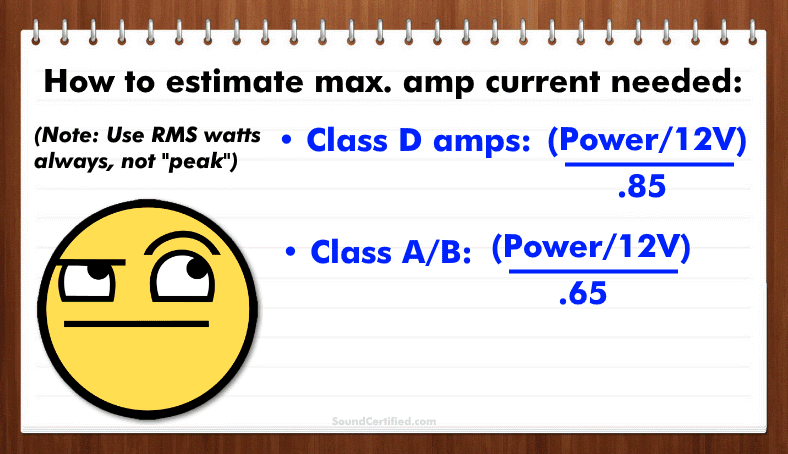
What voltage does a car amp need?
Car amps normally work off of a range of voltages, not just 12 volts, although that’s used as a general reference. In fact, as a vehicle’s engine runs the alternator charges the battery and the voltage can range from near 12V to about 14.4V.For home use, choose a power supply with a DC output from 12V to 13.8V, with 12V being perfectly fine to use. When shopping most of the higher-current supplies you’ll see are 12V anyhow.At around 11V or so car amps and other car stereo equipment may shut off so it’s important to have enough voltage available.
What size power supply do I need?
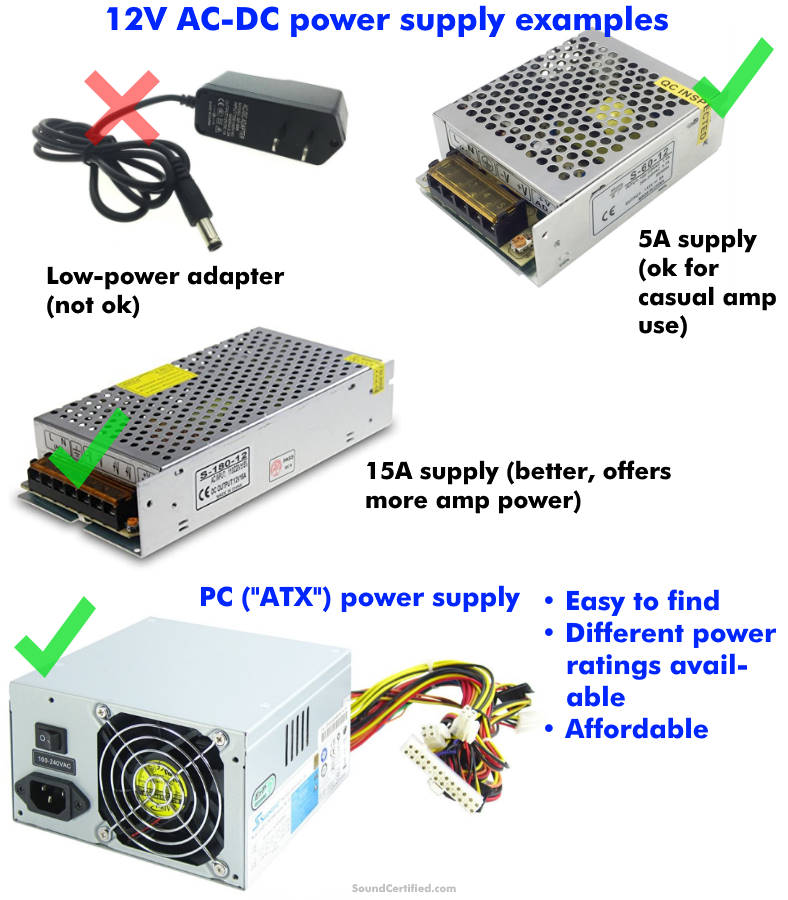
- Class D car amplifiers are more efficient and therefore waste less power (and draw less current) than standard class A/B amps.
- If you’re not sure what class your amp is, it’s probably class A/B. Class D amps normally say so on the amp itself, the box, or sales info. Class A/B types have been so popular for years that it’s a pretty safe assumption.
You can estimate amp current based on the maximum RMS power of the amp. Don’t use “peak” or “maximum” watt power ratings as these are misleading. We need to use the continuous power (RMS) the amp really delivers.As class D car amps are around 85% efficient and A/B amps are around 65% or so efficient we can use that to estimate the total current an amp would need.As you see, to run a car amp at full power you’ll need a pretty big power supply! However, most people don’t so it’s usually a lot less hassle (and less money) to use one of the other supplies I showed examples of.
How to wire a computer power supply to a car amp

- Power connections: Cut several ground wires (black) and +12V wires (yellow) and strip them for about 3/8″ to 1/2″ bare wire. Twist them together tightly or use a crimp connector (ring terminal, spade terminal, etc) and connect to the amp’s power & ground terminals.
- Supply on control: PC supplies don’t automatically come on even if the side switch is on. Normally a motherboard uses a control signal to the “supply on” wire pin. As shown in the diagram above, you’ll need to jumper the wire by cutting it, stripping it, and either connecting to a ground wire permanently or you can use a toggle switch.
- Amp remote on wire: As there are several good options for this, I’ll cover this in more detail below.
Once you’ve connected the supply-on wire to a ground wire the power supply should start and your car amp should work. Note that in some cases, it is possible to have a problem.Huge, high-power car amplifiers can sometimes have a short current “spike” they draw when first connected to power. In some cases, this can trip the self-protect mode in power supplies. If that happens you can try starting the supply first and then give the remote wire power after a moment.It’s possible you may need a more robust power supply if that happens as well. This shouldn’t be an issue most of the time, though.
Remote wire options for turning the car amp on
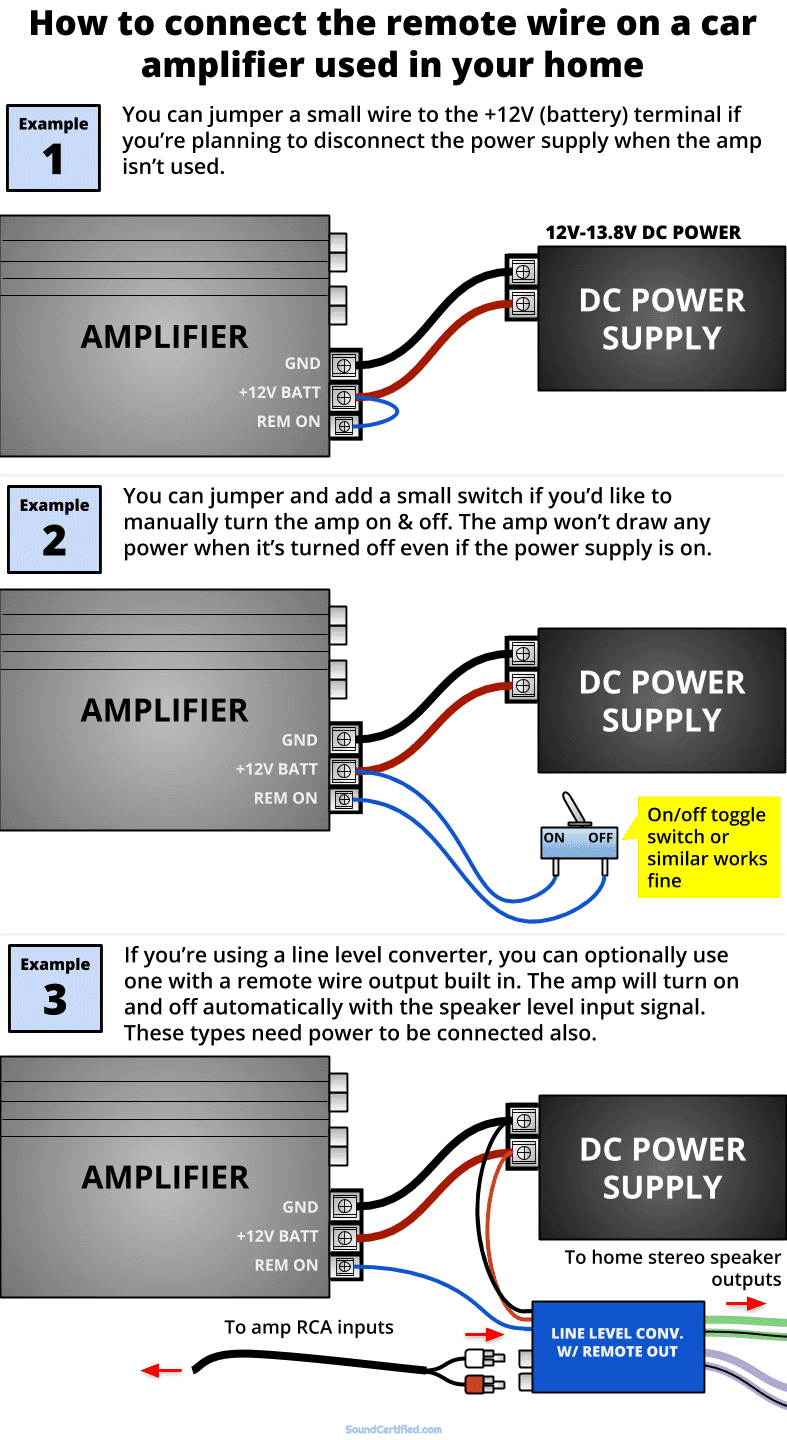
If you’re using a toggle switch on the remote wire you can leave the AC/DC power supply plugged in. When the amp’s remote wire is off (disconnected) the amp will shut off and won’t drain power.
RCA adapters with remote wire output
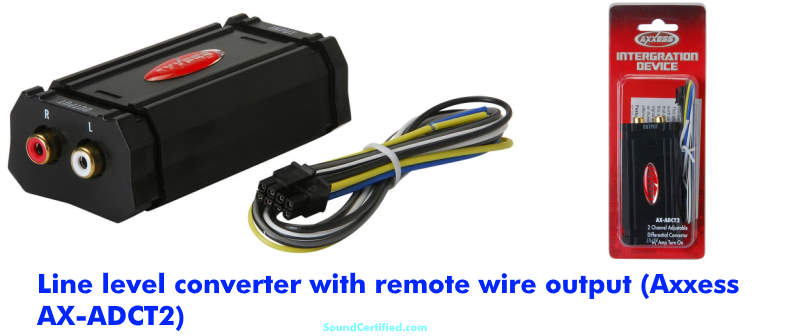
How to connect a home stereo, smartphone, or other audio sources to an amp
What’s great is how many options you have for getting an audio signal to your amp’s inputs. In fact, nearly any analog (non-digital) jack can be used from almost any device. I’ll cover some of the main ones here:
- Smartphones, tablets, and laptops can be used either by their headphone jack or via Bluetooth (see below)
- Any home stereo receiver or amp can be used – even vintage ones!
How to connect a smartphone or other device to a car amp (diagram & options)
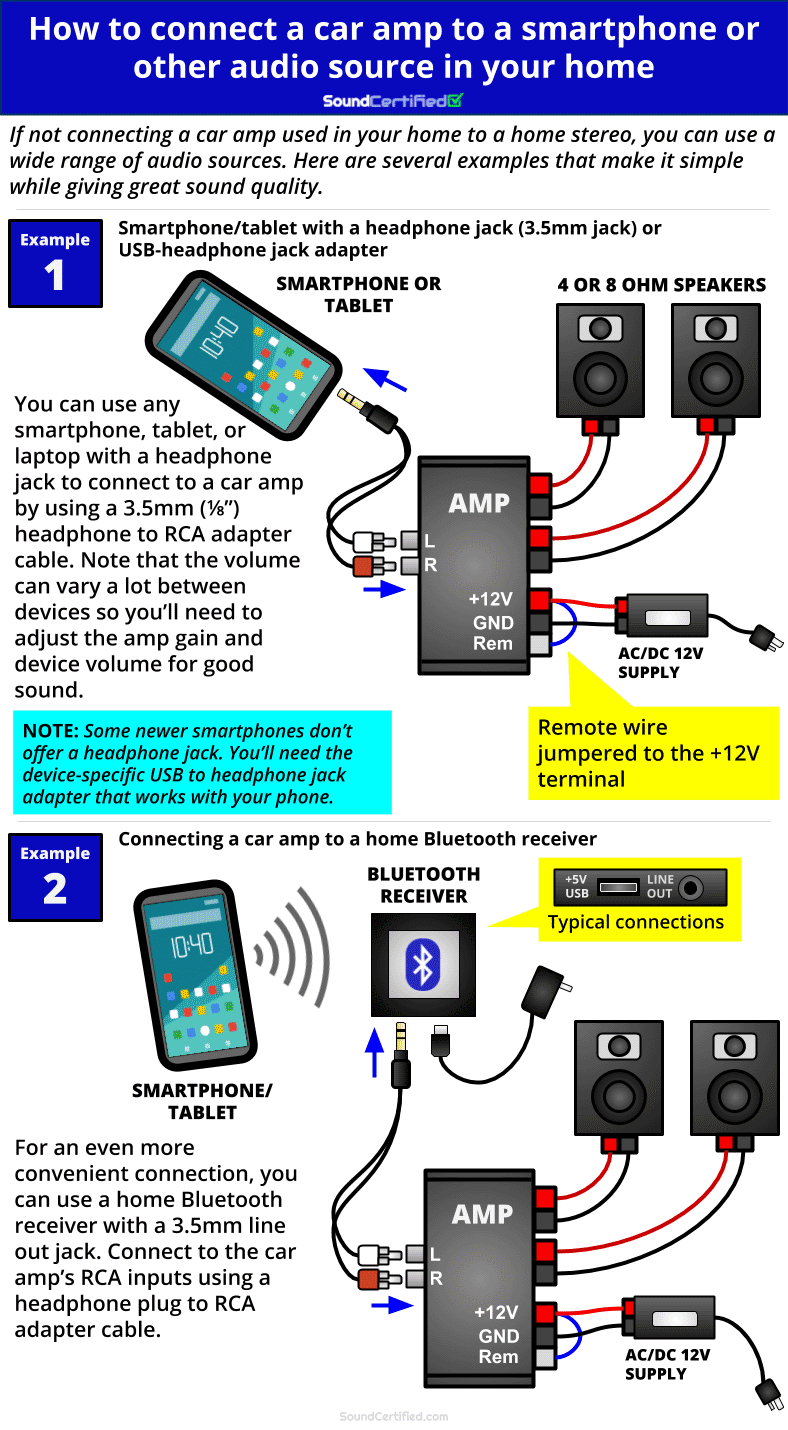
How to connect a car amp to a home stereo (diagram & options)
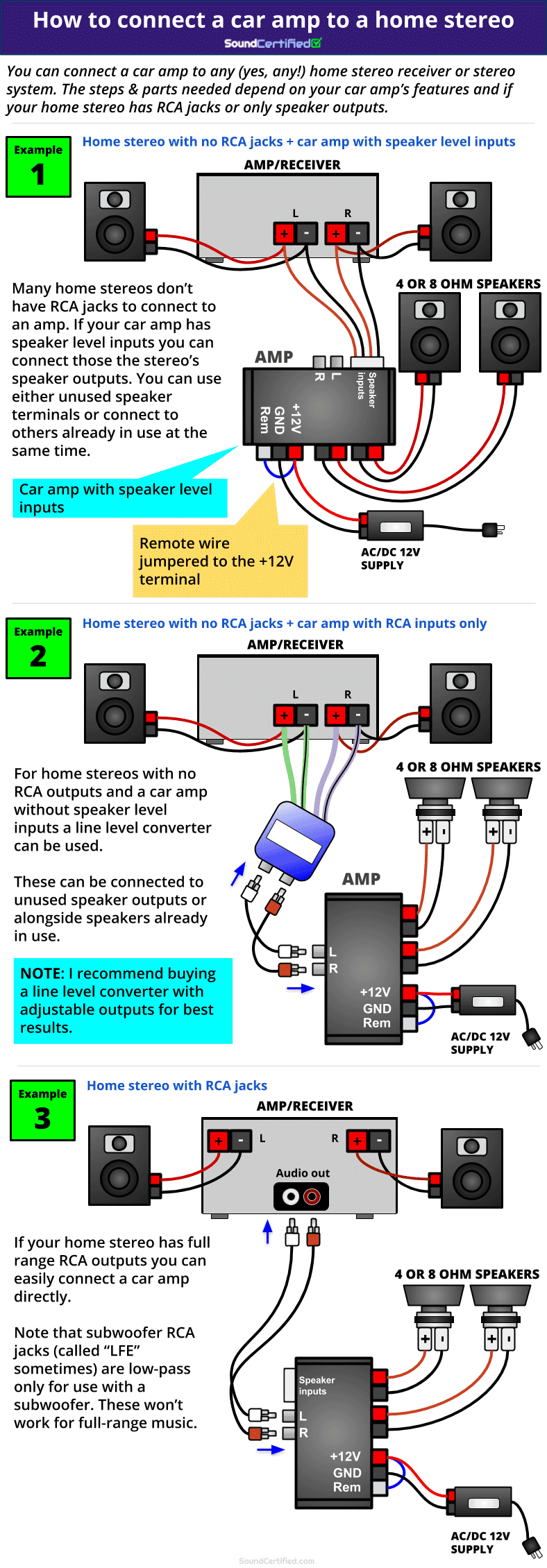
What is a line level (RCA) converter and how do they work?

What to do if you have ground loop noise (humming)
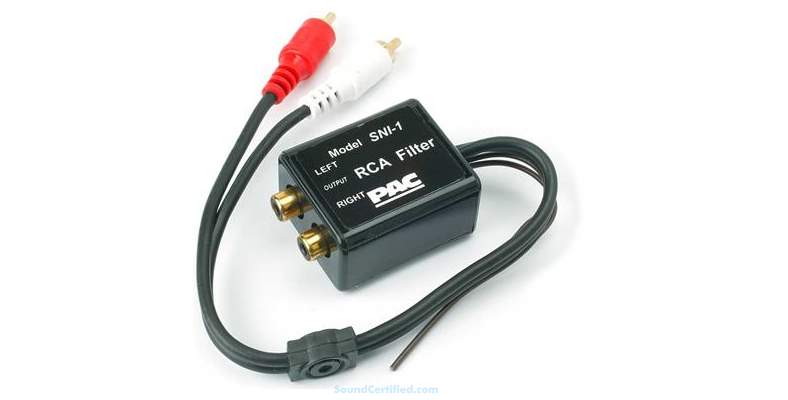
What causes ground loop noise?
Ground loop noise happens when there’s a slightly different potential (a slight difference in voltage) between the ground connections in an amp, stereo, and other components. Despite everything you try, sometimes it’s nearly impossible to eliminate.In that case, you can try a simple RCA cable ground loop isolator which often solves it. Note that you shouldn’t try to get the cheapest you find because they can negatively affect sound quality.You can find a good one for $10-$25 or above depending on the brand and features.
Don’t leave just yet! There are many more great articles here to help you learn more:
- Put your car sub to good use! You can connect a car subwoofer to a home stereo.
- Got an older home stereo? I’ll show you how use a subwoofer with a vintage home stereo.
- Connect speakers correctly with my speaker wiring diagram information here.
- Do you really need expensive speaker wire? Here are the facts vs myths about speaker wire & sound quality.
Got questions or comments?
Just reach out via my Contact page or leave a comment/question below. Thanks for reading!Read more: how to attract a mexican man
Last, Wallx.net sent you details about the topic “How To Power A Car Amp In Home❤️️”.Hope with useful information that the article “How To Power A Car Amp In Home” It will help readers to be more interested in “How To Power A Car Amp In Home [ ❤️️❤️️ ]”.
Posts “How To Power A Car Amp In Home” posted by on 2021-11-02 06:09:22. Thank you for reading the article at wallx.net





